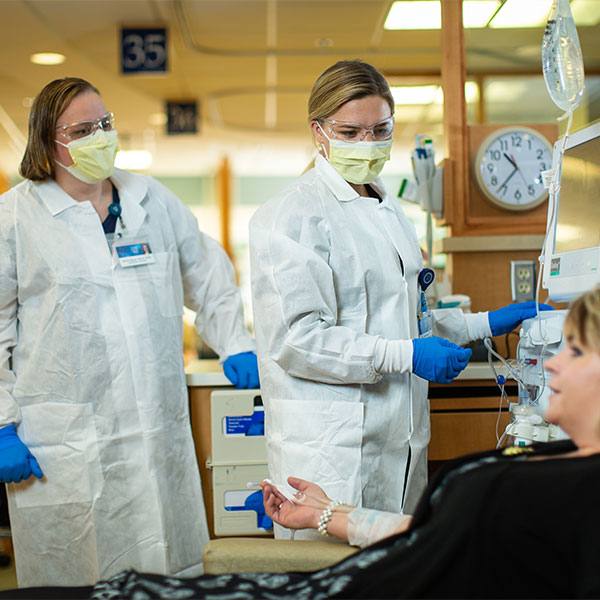-
Biotherapeutics
Regenerative Medicine Biotrust: advancing the practice through research
Regenerative medicine is a catalyst for innovation in health care, shifting the focus from treating symptoms of disease to unleashing the body’s ability to heal. Integral to the Mayo Clinic Center for Regenerative Medicine, the Center for Regenerative Medicine Biotrust is an important investment for Mayo Clinic. This unique resource enables physicians and scientists to develop regenerative technologies with the goal of bringing new cures to Mayo patients. The Biotrust provides resources, tools, technology and expertise to help Mayo Clinic scientists and physicians work collaboratively to advance regenerative sciences research from bench to bedside.

“It’s about supporting innovation and increasing therapeutic and diagnostic outputs,” says Dennis Wigle, M.D., Ph.D., chair of the Division of Thoracic Surgery and medical director of the Regenerative Medicine Biotrust. “The Biotrust offers a wealth of resources that would be hard for individual labs or investigators to develop on their own. It’s a pretty unique piece of infrastructure that few on the academic side have tackled.”
Mayo’s Center for Regenerative Medicine supports the Biotrust biorepository as one of its critical services to the clinical practice by facilitating the development of technologies that could lead to the manufacture of first-in-human therapeutics or development of novel diagnostic testing that will address the unmet needs of patients.
What is the Biotrust?
The Biotrust offers clinical and laboratory-based services for researchers. It is like a scientific library that instead of books, collects and lends human biospecimens for the purpose of discovering new regenerative solutions. Patients donate tissue, mostly through skin biopsies, blood donations or adipose tissue collections. Stem cells are either derived directly from the tissues or generated using innovative technologies to induce stemness. By providing access to living cells from the Biotrust, Mayo Clinic researchers and their outside collaborators are able to speed the development of therapeutic and diagnostic technologies. Investigators may also use these stem cells to further investigational studies into the causes and progression of disease through disease in a dish modeling systems. By doing so, this minimizes the impact on the patient by allowing investigators to detail the pathophysiology of disease and enable the testing of novel drugs prior to human trials. That could increase safety and avoid lengthy and costly human trials of non-efficacious drug candidates.

“The biggest value is expertise in obtaining samples from research subjects. For example, Mayo Clinic may have samples from a cohort of 20 patients with rare or orphan diseases. That gives us the ability to generate research materials at one institution rather than having investigators go to 20 different organizations,” says Zach Resch, Ph.D., operations manager of the Biotrust. “We have the capabilities to process and prepare samples under strict quality control that allows for storage and distribution across Mayo Clinic.”
Established in 2014 through a significant Mayo Clinic investment, the Regenerative Medicine Biotrust has grown its capabilities to include many new services, cell lines and disease applications. For example, the Biotrust has completed more than 1000 biopsies and dermal fibroblast isolations and derived mononuclear cells from 950 individual patients.
The Biotrust has the technology to reprogram adult stem cells harvested from skin for research and clinical application. Reprogramming a patient’s cells is like bringing them a step back in time to when they were embryonic cells. At that time, cells were dividing and could become any type of cell or tissue in the body. Those reprogrammed cells are engineered to become induced pluripotent stem cells that can be redirected to become representative brain, heart, lung, bone kidney, pancreas and nerve cells. Reprogrammed cells can be grown and expanded within the Biotrust’s lab to meet research and clinical needs. The Biotrust offers over 400 unique induced pluripotent stem cell lines from healthy and diseased patients.
Additional services include:
- Biomaterial validation
- Project design
- Regulated Distribution under institutional SCRO and IRB Biospecimens oversight
- Laboratory Training
- Somatic and stem cell banking
Benefit to the patient
With induced pluripotent stem cells developed in collaboration with the Biotrust, Michael Ackerman, M.D., Ph.D., recently was able to use a disease in a dish model along with other genetic sleuthing techniques to describe two entirely new syndromes. One is triadin knockout syndrome, a heart arrhythmia that could lead to cardiac arrest in children during exercise. The second is an autosomal recessive genetic mechanism for calcium release channel deficiency syndrome, prevalent within Amish communities. That key discovery solved the mystery of why so many Amish children were dying suddenly during ordinary childhood play.
Additional examples of how the Biotrust is advancing research into disease include:
- Developing and testing therapies to prevent blindness from macular degeneration and other ophthalmic disorders.
- Modeling a disease for Amyotrophic Lateral Sclerosis (ALS or Lou Gehrig’s disease), Alzheimer’s disease and chronic obstructive pulmonary disease (COPD).
- Examining the pathophysiology of chemotherapy-induced peripheral neuropathy.
- Developing cell therapy for type 1 diabetes.
“I have patients who are interested in whether cell therapy might someday be a possibility for conditions like COPD. Contributing samples to the Biotrust may be one way they could help advance research that could someday help improve treatment for their disease,” says Dr. Wigle.
The Biotrust fosters continuous innovation in the emerging field of regenerative sciences. That may be particularly important to discovering and refining new regenerative cures for diseases that are prevalent in an increasingly aging population.
###







